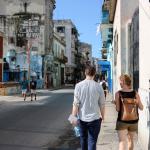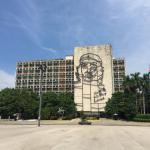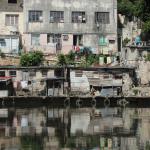


Cuba as Project: Urban, Political, and Environmental Transformations of the Island (ARCH 6308, COML 6073, SHUM 6308)
Tuesday, 12:20–2:15 p.m.
Course Instructors: Tao DuFour (architecture) and Tom McEnaney (comparative literature)
View a one-minute video clip of Havana Vignettes, a film made during the seminar's trip to Cuba.
This seminar explores the symbolic and political tensions and contradictions inherent in the motif of the island, in relation to both its contrast and conflation with the theme of the urban. Cuba stands, in this regard, as an exemplary site of the modern insular project. The seminar situates the island in its archipelagic context, as both a spatial and historical category, inquiring into continuities and ruptures that implicate Cuba in a wider horizon of appropriations of islands as both concrete geographies and symbolic territories.
Positioned within the Caribbean archipelago, Cuba has long been a space of transition. The restored colonial neighborhood of La Habana Vieja or the UNESCO-honored city of Trinidad, the monumental edifices of the Plaza de la Revolución in Havana and the “Che” Guevara mausoleum in Santa Clara, the towering constructivism of the Russian embassy, and the U.S. prison at Guantánamo Bay stand as physical markers of Cuba’s tumultuous political, economic, and cultural history. Alongside these structures, the legacy of socialist industrial and agricultural development leaves traces of its environmental effects on the culture, and in the soil, the sea, and the atmosphere. How will these conditions shift now, when Cuba is again at a nascent moment of fundamental change? In order to grapple with the island’s current transformation, and its relationship to the Caribbean, the Americas, and the wider global horizon, this course situates Cuba at the intersections of literature, architecture, art, urban planning, cartography, anthropology, political philosophy, and political ecology. We will investigate urban agriculture, neo-baroque aesthetics, colonial restoration projects, “ruinology,” public housing, new media infrastructure, and state projects oriented toward the incorporation of rural and hinterland geographies. We will explore themes of the “insular” from its understanding in antiquity to its medieval substitution of the forest as the domain of the marvelous and the wild, its cartographic genesis, its emblematic significance as utopia, its ideological appropriation toward modern notions of community, and its continuity as an ecological horizon of ontological plurality. The seminar will examine how symbolic and material practices structure the social and environmental space that shape and are shaped by the activity of the natural world, the extensions of the communist state, and the experience of everyday life.
Due to the interdisciplinary nature of the Expanded Practice Seminar, a wide range of skills and backgrounds are welcome. Advanced undergraduate students may apply, but preference will be given to students in their first three years of graduate study. Applications for the seminar and fellowships require a recent CV and a 500–700 word statement of interest describing your background interest in the seminar topic. No letters of recommendation are required.